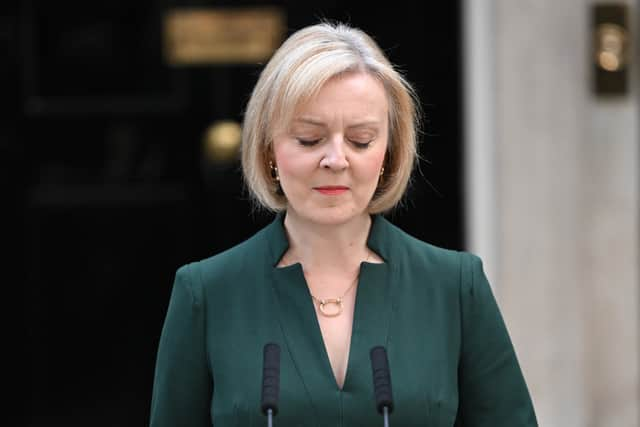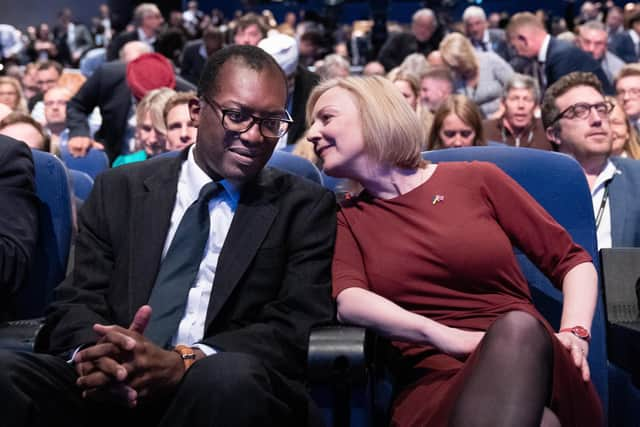Liz Truss comeback: what did she say to Sunday Telegraph about her time as shortest-serving Prime Minister?
and live on Freeview channel 276
Liz Truss has claimed she was never given a “realistic chance” to implement her radical tax-cutting agenda by her party and by a “powerful economic establishment ... that had shifted left-wards”.
In her first detailed comments since she was resigned from No 10, the UK’s shortest serving Prime Minister wrote in the Sunday Telegraph that she had not appreciated the strength of the resistance she would face to her plans. While she acknowledged that she was not “blameless” over the way her Chancellor Kwasi Kwarteng’s infamous mini-budget catastrophically unravelled, she still believed her approach to driving growth was the right one.
Advertisement
Hide AdAdvertisement
Hide AdThis is despite interest rates rocketing in recent months, particularly since Truss’s mini budget crashed the value of the pound and threatened to make inflation much worse. It has meant mortgage payers have faced a big cost of living squeeze in the form of major hikes to their monthly repayment costs.
Writing in The Sunday Telegraph, she said: “I am not claiming to be blameless in what happened, but fundamentally I was not given a realistic chance to enact my policies by a very powerful economic establishment, coupled with a lack of political support.
“I assumed upon entering Downing Street that my mandate would be respected and accepted. How wrong I was. While I anticipated resistance to my programme from the system, I underestimated the extent of it. Similarly, I underestimated the resistance inside the Conservative parliamentary party to move to a lower-tax, less-regulated economy.”


Truss’s brief premiership lasted just 49 days as she was forced to quit after Kwarteng’s £45 billion package of unfunded tax cuts panicked the markets and tanked the pound. Experts say this had a direct knock on affect on the base interest rate being hiked by the Bank of England, and mortgages going up.
Advertisement
Hide AdAdvertisement
Hide AdTruss said that while her experience last autumn was “bruising for me personally”, she believed that over the medium term her policies would have increased growth and therefore brought down debt. However she said she had not been warned of the risks to the bond markets from liability-driven investments (LDIs) – bought up by pension funds – which forced the Bank of England to step in to prevent them collapsing as the cost of government borrowing soared.
However Cambridge economic historian Charles Read has said he gave a lecture to Treasury civil servants on 8 September and sent a letter to Kwarteng personally warning about the risks of a budget that pushed up interest rates risked financial crisis.
In the wake of the mini-budget, she complained that the government was made a “scapegoat” for developments that had been brewing for some time. “Only now can I appreciate what a delicate tinderbox we were dealing with in respect of the LDIs,” she said.
“It rapidly became a market stability issue and we had to act to stabilise the situation. While the government was focused on investigating what had happened and taking action to remedy the situation, political and media commentators cast an immediate verdict blaming the mini-budget. Regrettably, the government became a useful scapegoat for problems that had been brewing over a number of months.”
Advertisement
Hide AdAdvertisement
Hide Ad

Danny Blanchflower, formerly a member of the Bank of England’s Monetary Policy Committee and is an economics professor at Dartmouth College, said: “My main conclusion from this is that it is important that Truss is never allowed to hold any sort of job that has to do with economics or thinking.”
Truss continued, saying that while, with the benefit of hindsight, she would have acted differently, she said that she had had to battle against the “instinctive views of the Treasury” and “the wider orthodox economic ecosystem”.
She said that her and Kwarteng’s plan for growth – with its combination of tax cuts and deregulation to kickstart the stalled economy – had represented a conscious break with the “left-wards” drift of economic thinking.
“Frankly, we were also pushing water uphill. Large parts of the media and the wider public sphere had become unfamiliar with key arguments about tax and economic policy and over time sentiment had shifted left-wards,” she said.
Advertisement
Hide AdAdvertisement
Hide Ad

She said the furore over her plan to abolish the 45p top rate of income tax – not least from within her own party – was illustrative of the difficulties she faced. “Even though the measure was economically sound, I underestimated the political backlash I would face, which focused almost entirely on the ‘optics’,” she said.
The Tory peer Lord Barwell, who was Theresa May’s chief of staff, was scathing about Truss’s explanation for the failure of her premiership.
“You were brought down because in a matter of weeks you lost the confidence of the financial markets, the electorate and your own MPs,” he tweeted. “During a profound cost of living crisis, you thought it was a priority to cut tax for the richest people in the country.”
For Labour, shadow chancellor Rachel Reeves said: “The Conservatives crashed the economy, sank the pound, put pensions in peril and made working people pay the price through higher mortgages for years to come. After 13 years of low growth, squeezed wages and higher taxes under the Tories, only Labour offers the leadership and ideas to fix our economy and to get it growing.”
Advertisement
Hide AdAdvertisement
Hide AdIn her 4,000 word article, she said she was “deeply disturbed” at having to sack Kwarteng, but believed she had been left with no choice. “At this point, it was clear that the policy agenda could not survive and my priority had to be avoiding a serious meltdown for the UK,” she said.
“I still believe that seeking to deliver the original policy prescription on which I had fought the leadership election was the right thing to do, but the forces against it were too great.”
While she regretted not being able to implement her plans, she said she had learned a lot from her experience, which she will expand on in the coming months.
“I have lost track of how many people have written to me or approached me since leaving Downing Street to say that they believe my diagnosis of the problems causing our country’s economic lethargy was correct and that they shared my enthusiasm for the solutions I was proposing,” she said.
“While I regret that I wasn’t able to implement my full programme, I am still optimistic for the future, with the United Kingdom now able to steer its own course as a free nation.”
Comment Guidelines
National World encourages reader discussion on our stories. User feedback, insights and back-and-forth exchanges add a rich layer of context to reporting. Please review our Community Guidelines before commenting.
